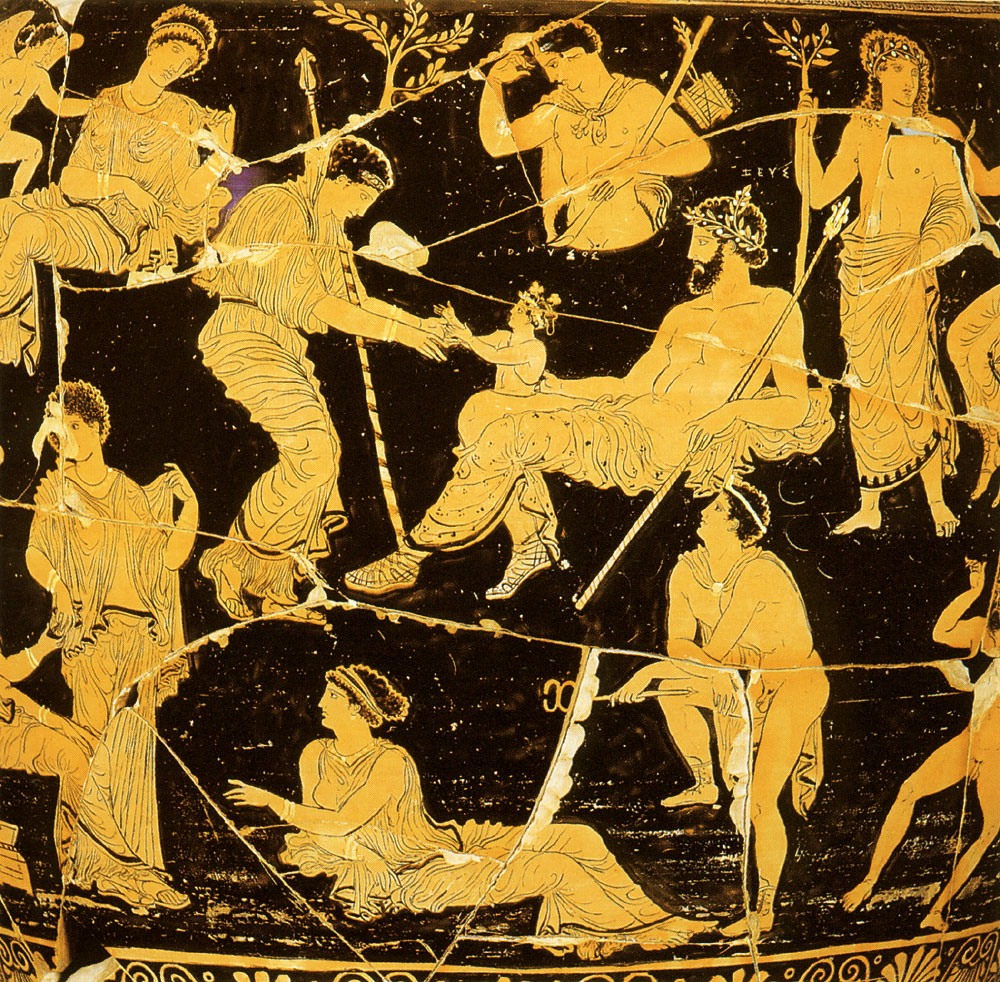Parties with drinking, dancing, and singing are rarely thought of as cults. Cults are often thought of as small religious groups that are frowned upon and viewed with suspicion by outsiders. Today, when we hear the word cult, we imagine people wearing white robes, creepy leaders and brainwashed followers who follow their leaders into rituals of mass suicide by Kool-Aid. In ancient Greece, however, everyone wanted to be a part of the Cult of Dionysus, where everyone would gather with free food, free wine, and the Goat Song.
Dionysus is the Greek God of wine, of winemaking, and of merriment and gaiety. He was supposed to have been born by the union of a mortal woman, Semele, princess of Thebes, and the greatest of the Greek gods, Zeus. Ancient Greek mythology holds that he was twice born, because when Semele was pregnant with Dionysus, Zeus took him and kept him in his thigh until he was ready to be born. While this may sound strange, there is a good explanation. Hera, Zeus’ wife who was also a goddess, had learned that Zeus had impregnated a moral woman; she was filled with jealousy and rage. The vengeful Hera disguised herself as a mortal woman and visited Semele. Once with her, she convinced Semele to ask Zeus to grant her one wish. When Semele asked for her one wish, Zeus promised to grant her anything. Semele asked Zeus to present himself in his true form, as a god not as a man, as suggested by Hera. Zeus kept his promise, but he knew that if Semele ever gazed upon him, she would die. So when he revealed himself to Semele in his true form, Zeus had Hermes take Dionysus from her womb and placed him into Zeus’ thigh so that he would not also die with Semele.1

As the god of wine, Dionysus is supposed to spread the knowledge of how to grow grape vines. In ancient Greece, wine was one of the few goods they could produce. Because of this, Dionysus was a major deity, and it was said that he was one of the twelve gods that lived upon Mount Olympus. Temples were erected in his honor and worship of him spread throughout the Greek poleis. Annual festivals called Dionysia were held in his honor and, of course, the purpose was to relax, feast, dance, and drink wine.2

Some dances in honor of Dionysus were performed on oiled wineskins, which were bags made out of animal skins that were filled with wine. Dionysus loved goats, donkeys, and tigers. Not only were those animals at the Dionysia, but their skins were also danced upon. When someone fell off the oiled wineskins, everyone cheered, laughed, and drank wine.
The Greeks held competitions to see who might be the manliest man and who could drink a pitcher of wine the fastest. The winner would receive a smaller oiled wineskin as a trophy, which was essentially another container of wine.3

At the annual Dionysia, the Goat Song was also preformed. The Goat Song gave birth to Greek drama. Originally, a song or hymn was sung as a goat was being sacrificed to Dionysus. The song often addressed questions that were arising about divine law, judgement, and various social conflicts of general concern. The Goat Song was seen as something of a group discussion or address of common concerns, and as a way for people collectively and individually to purify their minds. The hymn then became a performance piece, sung by a chorus. The performance evolved over time to include first a monologue, and then with the addition of a second voice, a dialogue. Eventually, more voices were added, and the performance of the Goat Song became the tragic drama we have come to associate with the great Greek tragedians Aeschylus, Sophocles, and Euripides. In fact, the Greek word tragedia, from which we get our word tragedy, literally translates as “the song of a male goat.” The Greeks truly loved drama because they felt that the gods were speaking to them and judging their piety, rather than merely being annoyed by them.4
The cult of Dionysus does not seem so suspicious now. There were not any outrageous daily rituals or strange articles of clothing they had to wear. The cult of Dionysus consisted of dancing, drinking, singing, and feasting, every college student’s four favorite things.
- Salem Press Encyclopedia, January 2016, s.v. “Dionysus,” by Rebecca K. Rector. ↵
- Eleni Pachoumi, “Dionysus in the Greek Magical Papyri,” Symboae Osloenses 88, no. 1, (2014): 129. ↵
- Alana Koontz, “The Art and Artifacts Associated with the Cult of Dionysus,” (Masters Thesis, University of Wisconsin-Milwaukee, 2013), 4. ↵
- Britt-Mari Näsström, “The rites in the mysteries of Dionysus: the birth of the drama,” Åbo Akademi: Open Journal Systems. (2014): BASE, EBSCOhost. ↵



77 comments
Carlos Aparicio
Probably one one my favorite articles because I can relate to this topic so much! From the start, Jennifer kept me interested in the topic with Dionysus. In all honesty, I have never even heard of Dionysus or what he represented. I always believed a cult was men with robes on and acting. I never knew that the Cult of Dionysus was so popular. I love how the author connected Dionysus, Zeus, Hera, and Semele. Almost every college student can relate to this and that’s why I believe a lot of other people will find this topics interesting the way I did.
Ezequiel De La Fuente
Interesting to hear of a story about a cult that isn’t a religious extremist one. I agree with you, we only hear of cults that have to do with death and evil deities. Your article was informative and I really enjoyed the story of how Dionysus was born. I enjoyed seeing an article that revolved around Greek mythology as they have always interesting. Keep it up!
Lisa Varela
This news article did a great job on giving the reader a picture of what they were trying to describe. I particularly liked the first paragraph in which the author made it clear that the cult of Dionysus practices was not as those that we associate with cult behavior today. The story or myth behind the birth of Dionysus is a story that I have heard several times, however, it’s a story that I never get tired of.
Amber Aragon Alvarado
I’ve never heard about the God of wine! It was so interesting learning about how Greeks devoted so much time into making a celebration in the Greek God’s honor. The rituals they had were fascinating as it demonstrated the power wine and Dionysus had on their society. I liked that this article gave the backstory of Dionysus and found it interesting how Zeus cared for his child in a certain manner. Overall, it was such an informative article as I didn’t know much about the Greek practices.
Joel Gracia
Great article. I indeed had a negative connotation associated with the world “cult”, and I still do due to the modern extremists that lead many of them, but I now know that there are polar opposite sides of the spectrum when it comes to these mysterious religious movements. It served as a nice introduction to the topic and makes me want to do more research on it.
Veronica Spryszynski
Article kept me engaged! I do think of cults with weird costumes and abnormal acts but the way that cults started sound very fun, I wish cults could’ve stayed how they were back then. I like how you included a background story to what the cult was with Zeus, Semele, and Hera. Im interested in Ancient Greek gods and each of their personal stories.
Alexandria Martinez
This was a great article, I was actually just learning about how theatre came from religion. It is interesting how things can come from the strangest places, who would have really thought that the reason we all enjoy and preform in plays is because of the religious reasons from way back when. It is also interesting that the meaning of the word cult has changed so much from what it meant back in the time of Dionysus.
Thomas Fraire
The intro was really cool, it caught my attention. I like how they hint at well-known cults from the past like Jonestown. Definitely wanted to hear more about the cult and less about the god, they worshiped. It was really funny how the writer appealed to the average college students interests via talking about a cult that Partied, drank, danced, and feasted.
Samman Tyata
Wow! I really liked your article a lot. I didn’t know about the god of wine Dionysius before, I found the details really interesting as I went through the article. Like, from the details of being born by the union of a mortal woman, and the greatest of the Greek gods, the Dionysia festival and more. Furthermore, I am amazed by the fact that, the Goat Song gave birth to Greek drama and Dionysia was held in his honor. To sum it up, the article is well structured and it was a good read.
Tara Sellers
Dionysus was the Greek wine god. I never knew of how Dionysus was born I knew he was originally a half blood or demigod. This article explains why Dionysus was important enough to become one of the twelve Olympians. It explains how grapes was one of the few goods Greece could produce. It also tells us how he was celebrated through parties and temples dedicated to him.